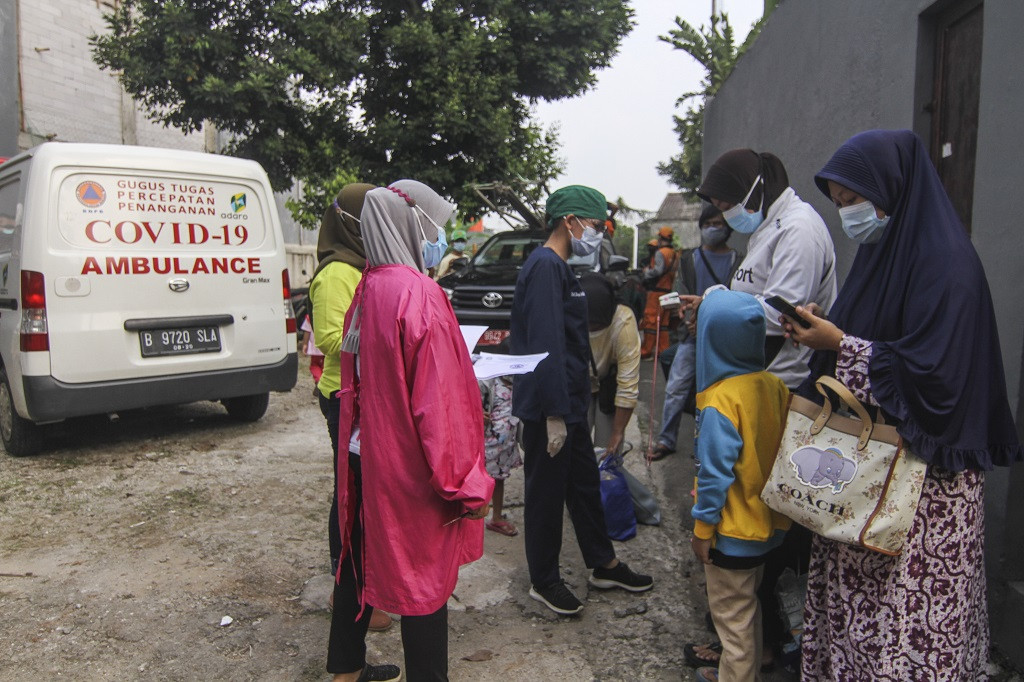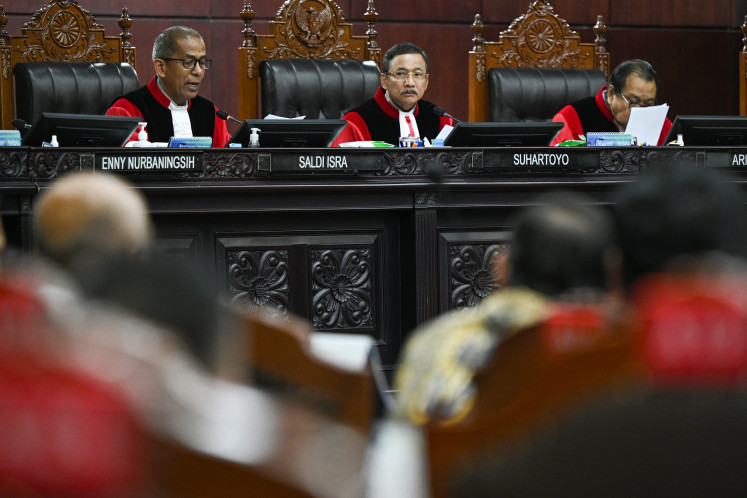Popular Reads
Top Results
Can't find what you're looking for?
View all search resultsPopular Reads
Top Results
Can't find what you're looking for?
View all search resultsPost-Idul Fitri COVID-19 surge imminent with daily case rise, new clusters
Indonesian health authorities find that most daily case rises and new emerging infection clusters are linked to mudik (exodus) travel or Idul Fitri gatherings.
Change text size
Gift Premium Articles
to Anyone
I
ndonesian health authorities have recorded a surge in the number of COVID-19 cases as well as emerging new infection clusters across the country linked to the Idul Fitri holiday, roughly a week after the holiday season.
The surge was first announced by national COVID-19 task force spokesperson Wiku Adisasmito, who said the average number of confirmed cases between May 17 and 23 had increased 36.1 percent compared to the previous week. The COVID-19 death rate also rose 13.8 percent in the same period.
According to the official data, the government reported around 3,723 daily new cases on May 16 on a rolling seven-day average. On May 23, the figure rose to 5,067.
“Usually, the number of cases increases two or three weeks after a long holiday season. However, a significant surge occurred only a week after the Idul Fitri holiday [on May 13]. This should be a warning for us,” Wiku said on Tuesday.
Most of the new cases were discovered in provinces most visited by travelers during the Idul Fitri mudik (exodus) season, such as West Java, Central Java and West Sumatra. Jakarta, the origin city of most travelers, also recorded a spike in new cases.
At least 1.5 million people traveled to their hometowns over the Idul Fitri holidays, despite the government ban and the increased security measures in the regions’ borders. Authorities recorded they set up around 381 checkpoints across the three most populous islands of Sumatra, Java and Bali.
The national task force has also reported a low level of public compliance with health rules and restrictions since the second week of Ramadan in mid-April as public places were packed with visitors.
Read also: Pandemic fatigue ‘the cause’ of growing defiance against COVID-19 rules
Authorities recently discovered dozens of new infection clusters across the archipelago, most of which involved people coming back from mudik travel.
A neighborhood unit (RT) in Cilangkap, East Jakarta was put under a local lockdown last week after 104 of its 700 residents tested positive for the coronavirus. Local officials said most of them had attended Idul Fitri gatherings and visited relatives during the holiday.
Central Java Health Agency head Yulianto Prabowo said Kudus was among the regions in the province that had recorded a surge in COVID-19 cases around 14 days after the Idul Fitri holiday.
The surge caused the bed occupancy rate of two COVID-19 referral centers in the city -- Lukmono Hadi Regional General Hospital and Mardi Rahayu Hospital -- to reach 90 percent.
“We are sending new patients from the region to hospitals in Semarang and have added twice the current number of beds. For this, we are training health workers in isolation and intensive care treatment,” Yulianto said on Friday.
He added the agency had ordered all hospitals to reopen their special isolation wards for COVID-19 patients to anticipate the surge. Previously, most hospitals across Central Java had closed their isolation rooms following a decrease in the bed occupancy rate for COVID-19 patients.
A rise in the bed occupancy rate also occurred in the COVID-19 emergency hospital at Wisma Atlet in Central Jakarta in the past week, with 1,300 out of its 4,000 beds occupied by patients. Most of the cases discovered in Wisma Atlet were linked to family clusters, said the hospital coordinator Tugas Ratmono as reported by tribunnews.com.
Coordinating Economic Minister Airlangga Hartarto, who also heads the National Economic Recovery and COVID-19 Response Team, warned the case spike could potentially occur until five weeks after the Idul Fitri holiday as happened during previous long holiday seasons.
In the weeks following the Idul Fitri holiday last year, when thousands also violated the mudik ban, nationwide cases skyrocketed by 68-93 percent, while fatalities climbed 28-66 percent.
In anticipation of the case surge, the government extended its mobility restrictions, dubbed micro-scale public activity restrictions (PPKM Mikro), to all provinces from June 1 to 14. Previously, it was only imposed on 30 of 34 provinces.
Under the restrictions, neighborhood and community units have to enforce restrictions and public health surveillance that best suits their level of risk. The higher the risk of transmission -- determined regularly by a COVID-19 task force in the city or regency -- the tighter the restrictions.
But the government still allows offices, places of worship, restaurants and other public facilities to remain open at 50 percent of maximum capacity during the latest round of PPKM Mikro.
Hermawan Saputra of the Indonesian Public Health Expert Association (IAKMI) slammed the government for being “too late” in imposing the restrictions.
"The government always takes a reactive approach instead of a preventive one in curbing the outbreak. For example, they allowed tourist spots and shopping centers to remain open during the holiday season and only closed them after they discovered crowds in those places,” Hermawan said on Wednesday.
He called on the government to implement tighter mobility restrictions in all parts of the country to prevent hospitals from being overwhelmed amid potential case surges in many regions.
The public health expert also said data on the risk status in community and neighborhood units were not reliable as testing and tracing rates in several regions were low.
Read also: COVID-19 case spike looms as millions skirt 'mudik' ban
Health Minister Budi Gunadi Sadikin said he had found that some local administrations intentionally reduced their testing rate, so their risk status could improve. “[It’s dangerous as] the number of cases could explode, especially with the discovery of new variants of concern in the country,” he said as reported by kompas.com.
The minister referred to the B.1.617 variant of COVID-19 first discovered in India. The World Health Organization has classified the variant as a variant of global concern as several studies show it is more transmissible than other variants.
In Central Java’s Cilacap, at least 48 health workers tested positive after treating dozens of foreign ship crew who were sick with the virus. The cargo ship docked at Tanjung Intan Port on April 25 in Cilacap, bringing refined sugar from India.
At least 13 crew tested positive following a mandatory COVID-19 test at the dock. One of them died in the hospital a week later. A whole-genome sequencing test later found some of the Filipino crew were infected with the B.1.617 variant.
-- Ardila Syakriah and Yerica Lai contributed to the story.










